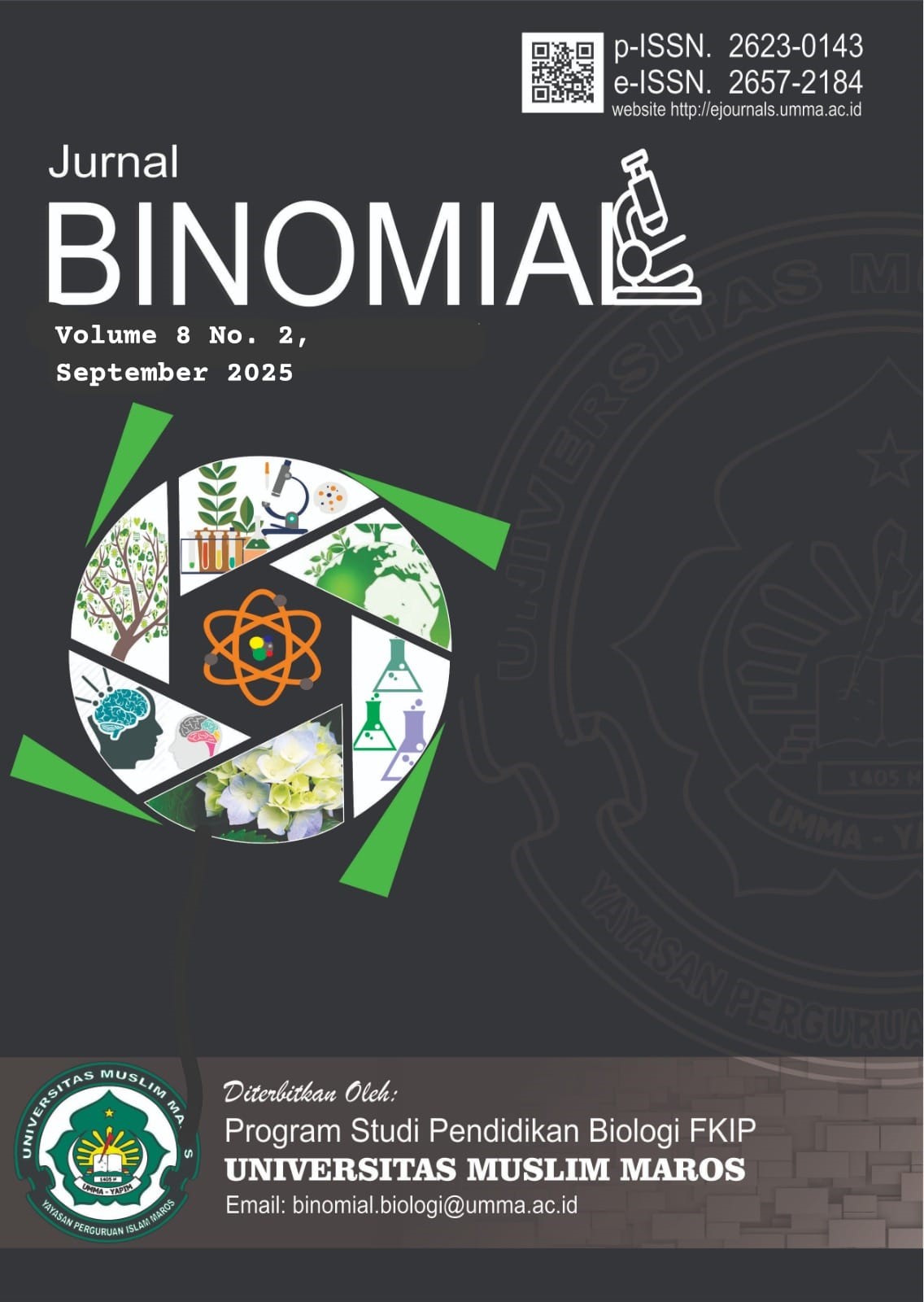IMPLEMENTASI MODEL PEMBELAJARAN PJ4CS UNTUK MENGATASI MISKONSEPSI BIOLOGI SISWA SMA NEGERI 5 KOTA TERNATE
DOI:
https://doi.org/10.46918/bn.v8i2.2762Keywords:
Kolaboratif, miskonsepsi biologi, model pembelajaranAbstract
Misconceptions brought by students in the learning process will cause cognitive conflict when learning new concepts or empirical facts. Teachers need to correct these misconceptions to prevent ongoing conceptual errors. The purpose of this study was to analyze the effect of the Pj4CS (integrated scaffolding project-based learning) model to overcome biology misconceptions. This type of research was a quasi-experimental study with a sample of 70 students of SMA Negeri 5 Kota Ternate, North Maluku. The instruments used were misconception questions, student response sheets and observation sheets. Data were analyzed using normality tests, homogeneity tests, and hypothesis tests. The results of the independent samples test obtained a significance value (2-tailed) of 0.000 <0.05, so H0 was rejected and Ha was accepted. The conclusion of this study is that there is an effect of the Pj4CS model to overcome biology misconceptions of grade XI students of SMA Negeri 5 Kota Ternate. Student misconceptions in the experimental class decreased from 63.75% to 25.13%. The Pj4CS model can be an alternative learning model that can be used by teachers in schools to overcome misconceptions and collaborative learning to train independent learning
References
Agustina, R., Sipahutar, H., & Harahap, F. (2016). Analisis Miskonsepsi pada Buku Ajar Biologi SMA Kelas XII. Jurnal Pendidikan Biologi, 5(2). https://doi.org/10.24114/jpb.v5i2.4307
Akmam, A., Anshari, R., Amir, H., Jalinus, N., & Amran, A. (2018). Influence of Learning Strategy of Cognitive Conflict on Student Misconception in Computational Physics Course. IOP Conference Series: Materials Science and Engineering, 335(012074), 1–7. https://doi.org/10.1088/1757-899X/335/1/012074
Amin, A. M., & Karmila, F. (2024). Desain Pengembangan Model Pembelajaran Berbasis Proyek Terintegrasi Kompetensi Global 4c-Scaffolding (Pj4CS). CV Pustaka Madani.
Amin, A. M., Karmila, F., Rahma, D., & Hama, N. H. (2025). The Impact of the Integrated Project-Based and 4C-Scaffolding (Pj4CS) Model on Learners ’ Digital Literacy in Biology. Proceedings of the 3rd International Conference on Mathematics and Science Education (ICMSE 2024), Advances in Social Science, Education and Humanities Research 922, Icmse 2024. https://doi.org/10.2991/978-2-38476-402-0
Barbieri, C. A., Miller-Cotto, D., & Booth, J. L. (2019). Lessening the Load of Misconceptions: Design-Based Principles for Algebra Learning. Journal of the Learning Sciences, 28(3), 381–417. https://doi.org/10.1080/10508406.2019.1573428
Çelikkanlı, N. O., & Kızılcık, H. Ş. (2022). A Review of Studies about Four-Tier Diagnostic Tests in Physics Education. Journal of Turkish Science Education, 19(4), 1291–1311. https://doi.org/10.36681/tused.2022.175
Grospietsch, F., & Mayer, J. (2018). Professionalizing Pre-service Biology Teachers’ Misconceptions about Learning and the Brain through Conceptual Change. Education Sciences, 8(3), 1–23. https://doi.org/10.3390/educsci8030120
Hama, N. H., & Amin, A. M. (2025). Using Integrated Project-Based and 4C-Scaffolding ( PJ4CS ) to Improve Students ’ Critical Thinking Skills. Jurnal Innornatus, 5(1), 25–36. https://doi.org/10.30862/inornatus.v5i1.738
Ilhan, A., & Akin, M. F. (2022). Analysis of Contextual Problem Solutions, Mathematical Sentences, and Misconceptions of Pre-Service Mathematics Teachers. International Electronic Journal of Mathematics Education, 17(1), em0666. https://doi.org/10.29333/iejme/11470
Keskin, B., & Ozay-Kose, E. (2017). Misconceptions of Prospective Biology Teachers about Theory of Evolution. Necatibey Faculty of Education, Electronic Journal of Science and Mathematics Education, 11(2), 212–242. https://doi.org/10.17522/balikesirnef.373344
Markula, A., & Aksela, M. (2022). The Key Characteristics of Project-Based Learning: How Teachers Implement Projects in K-12 Science Education. Disciplinary and Interdisciplinary Science Education Research, 4(2), 1–17. https://doi.org/10.1186/s43031-021-00042-x.
Maryanti, R., Hufad, A., Sunardi, S., & Nandiyanto, A. B. . (2022). Teaching High School Students With/Without Special Needs and Their Misconception on Corrosion. Journal of Engineering Science and Technology, 17(1), 0225–0238. https://doi.org/https://jestec.taylors.edu.my/Vol%2017%20Issue%201%20February%20%202022/17_1_17.pdf
Moodley, K., & Gaigher, E. (2019). Teaching Electric Circuits: Teachers’ Perceptions and Learners’ Misconceptions. Research in Science Education, 49, 73–89. https://doi.org/https://doi.org/10.1007/s11165-0179615-5
Neidorf, T., Arora, A., Erberber, E., & Tsokodayi, Y. (2020). Student Misconceptions And Errors in Physics and Mathematics: Exploring Data from TIMSS and TIMSS. Springer. https://doi.org/https://doi.org/10.1007/978-3030-30188-0.
Nga, L. T. Q., Hanh, V. T. P., Mai, M.T., Thuy, N.T., & Hai, D.V. (2024). Developing the Competency to Organize Experiential and Career Guidance Activities of High School Teachers. Multidisiplinary Science Journal, 7(9), 1-9. https://doi.org/10.31893/multiscience.2025274
Rohana, D., Sukasno, S., & Purwasi, L. A. (2019). Model Problem Based Learning (PBL) dengan Teknik Scaffolding terhadap Kemampuan Pemecahan Masalah Matematika. Jurnal Pendidikan Matematika RAFA, 5(2), 142-151. https://doi.org/10.19109/jpmrafa.v5i2.4136
Soeharto, Csapó, B., Sarimanah, E., Dewi, F. I., & Sabri, T. (2019). A Review of Students’ Common Misconceptions in Science and Their Diagnostic Assessment Tools. Jurnal Pendidikan IPA Indonesia, 8(2), 247–266. https://doi.org/10.15294/jpii.v8i2.18649
Thouin, M. (2020). La didactique: Essentielle, Mais Menacée. Didactique, 1(1), 61–86. https://doi.org/10.37571/2020.0104













